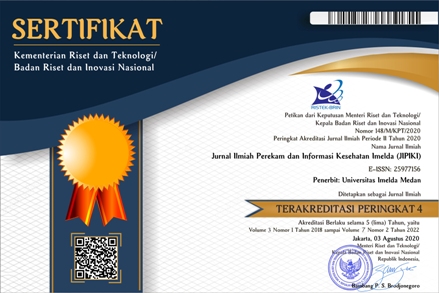Pengaruh Akreditasi Untuk Meningkatkan Mutu Pelayanan dan Keselamatan Pasien di Rumah Sakit (Studi Sistematik Review)
DOI:
https://doi.org/10.52943/jipiki.v7i1.712Keywords:
Quality, hospital services, patient safety, accrediationAbstract
Hospital accreditation is a government recognition of hospitals that have met the standards that have been set to get an idea of the extent of meeting hospital standards in Indonesia, so that the quality of service can be accounted for. The purpose of review research is systematic to find out the influence of accreditation in improving the quality of service and patient safety in hospitals. The research design used in this study is Systematic Review. The purpose of this method is to help researchers better understand the background of the research that is the subject of the topic sought and understand why and how the results of the study so that it can be a reference for new research. Independent variables are accreditation and variable dependents, namely the quality of hospital services and the safety of hospital patients. Researchers conducted a search for data through the websites of accessible journal portals such as PubMed, Elsevier, Springer, and Google Schoolar. The results showed after the collection of journals using accredited journal sites such as PubMed, Elsevier, Springer, and Google Schoolar. 496 journals were identified and eligibility criteria were carried out. Then after it was filtered obtained 23 journals, then excluded studies were obtained 3 journals met the exclusion criteria, after that based on inclusion criteria so that the total number of articles eligible for review was 20 articles. Quality improvement in all fields, especially in the field of health, one of which is through Hospital Accreditation towards the quality of International services. In the accreditation system that refers to the Standards of the Joint Commission International (JCI) obtained the most relevant standards related to the quality of hospital services International Patient Safety Goals (international targets of patient safety) which includes six hospital patient safety goals.
Downloads
References
Algunmeeyn, A., Alrawashdeh, M., & Alhabashneh, H. (2020). Benefits of applying for hospital accreditation: The perspective of staff. Journal of Nursing Management, 28(6), 1233–1240. https://doi.org/10.1111/jonm.13066
Corrêa, J. É., Turrioni, J. B., De Paiva, A. P., De Carvalho Paes, V., Balestrassi, P. P., Papandrea, P. J., & De Carvalho Gonçalves, E. D. (2018). The Influence of Accreditation on the Sustainability of Organizations with the Brazilian Accreditation Methodology. Journal of Healthcare Engineering, 2018, 5–9. https://doi.org/10.1155/2018/1393585
Desveaux, L., Mitchell, J. I., Shaw, J., & Ivers, N. M. (2017). Understanding the impact of accreditation on quality in healthcare: A grounded theory approach. International Journal for Quality in Health Care, 29(7), 941–947. https://doi.org/10.1093/intqhc/mzx136
Devkaran, S., & O’Farrell, P. N. (2014). The impact of hospital accreditation on clinical documentation compliance: A life cycle explanation using interrupted time series analysis. BMJ Open, 4(8). https://doi.org/10.1136/bmjopen-2014-005240
Frank, J. R., Taber, S., Van Zanten, M., Scheele, F., & Blouin, D. (2020). The role of accreditation in 21st century health professions education: Report of an International Consensus Group. BMC Medical Education, 20(Suppl 1), 1–9. https://doi.org/10.1186/s12909-020-02121-5
Ghadami, L., Masoudi Asl, I., Hessam, S., & Modiri, M. (2019). Developing hospital accreditation standards: Applying fuzzy DEMATEL. International Journal of Healthcare Management, 0(0), 1–9. https://doi.org/10.1080/20479700.2019.1702307
Ghareeb, A., Said, H., & El Zoghbi, M. (2018). Examining the impact of accreditation on a primary healthcare organization in Qatar. BMC Medical Education, 18(1), 1–8. https://doi.org/10.1186/s12909-018-1321-0
Gökmen Kavak, D., Öksüz, A. S., Cengiz, C., Kayral, ?. H., & Çizmeci ?enel, F. (2020). The importance of quality and accreditation in health care services in the process of struggle against covid-19. Turkish Journal of Medical Sciences, 50(8), 1760–1770. https://doi.org/10.3906/sag-2007-279
Inomata, T., Mizuno, J., Iwagami, M., Kawasaki, S., Shimada, A., Inada, E., … Amano, A. (2018). The impact of Joint Commission International accreditation on time periods in the operating room: A retrospective observational study. PLoS ONE, 13(9), 1–10. https://doi.org/10.1371/journal.pone.0204301
King, E. J. (2018). HIV testing for pregnant women: A rights-based analysis of national policies. 08(03), 326–341.
Komisi Akreditasi Rumah Sakit. (2011). Standar Akreditasi Rumah Sakit 2012. Standar Akreditasi Rumah Sakit, September, 1–175.
Lam, M. B., Figueroa, J. F., Feyman, Y., Reimold, K. E., Orav, E. J., & Jha, A. K. (2018). Association between patient outcomes and accreditation in US hospitals: Observational study. BMJ (Online), 363, 1–10. https://doi.org/10.1136/bmj.k4011
Mansour, W., Boyd, A., & Walshe, K. (2020). The development of hospital accreditation in low- And middle-income countries: A literature review. Health Policy and Planning, 35(6), 684–700. https://doi.org/10.1093/heapol/czaa011
Nikki Rider, Cassandra M. Frazier, Sarah McKasson, Liza Corso, J. M. (2018). Achieving Public Health Standards and Increasing Accreditation Readiness: Findings From the National Public Health Improvement Initiative. J Public Health Manag Pract, 24(4), 139–148. https://doi.org/10.1097/PHH.0000000000000660.Achieving
Paramita, D. A., Arso, S. P., Kusumawati, A., Masyarakat, F. K., Diponegoro, U., Masyarakat, F. K., & Diponegoro, U. (2020). Faktor – Faktor Yang Berhubungan Dengan Motivasi Perawat Dalam Pelaporan Insiden Keselamatan Pasien Di Rumah Sakit X Kota Semarang. Jurnal Kesehatan Masyarakat (e-Journal), 8(6), 724–730.
Plebani, M., & Sciacovelli, L. (2017). ISO 15189 Accreditation: Navigation between Quality Management and Patient Safety. Journal of Medical Biochemistry, 36(3), 225–230. https://doi.org/10.1515/jomb-2017-0038
Poerwani’ Dan, S. K., & Sopacua’, E. (2006). Akreditasl Sebagai Upaya Peningkatan Mutu Pelayanan Rumah Saklt. Buleti Penelitian Sistem Kesehatan, 9(3), 125–133.
Putro, S., Wardhani, V., & Siswanto, S. (2018). Apakah Status Akreditasi Rumah Sakit Memberikan Perbedaan Pemberian Obat yang Benar dan Keselamatan Pasien? Media Kesehatan Masyarakat Indonesia, 14(4), 378. https://doi.org/10.30597/mkmi.v14i4.4385
Sack, C., Scherag, A., Lütkes, P., Günther, W., Jöckel, K. H., & Holtmann, G. (2011). Is there an association between hospital accreditation and patient satisfaction with hospital care? A survey of 37 000 patients treated by 73 hospitals. International Journal for Quality in Health Care, 23(3), 278–283. https://doi.org/10.1093/intqhc/mzr
Trust, P. P., Protection, P., Committee, P., Human, P., Policy, H. S., Isbn, M., Pdf, T., Press, N. A., Press, N. A., Academy, N., Academy, N., & Press, N. A. (2001). Preserving Public Trust: Accreditation and Human Research Participant Protection Programs.
Ulumiyah, N. H. (2018). Meningkatkan Mutu Pelayanan Kesehatan Dengan Penerapan Upaya Keselamatan Pasien Di Puskesmas. Jurnal Administrasi Kesehatan Indonesia, 6(2), 149. https://doi.org/10.20473/jaki.v6i2.2018.149-155
Unruh, L., & Hofler, R. (2016). Predictors of Gaps in Patient Safety and Quality in U.S. Hospitals. Health Services Research, 51(6), 2258–2281. https://doi.org/10.1111/1475-6773.12468
Wardhani, V., Van Dijk, J. P., & Utarini, A. (2019). Hospitals accreditation status in Indonesia: Associated with hospital characteristics, market competition intensity, and hospital performance? BMC Health Services Research, 19(1), 1–10. https://doi.org/10.1186/s12913-019-4187-x











